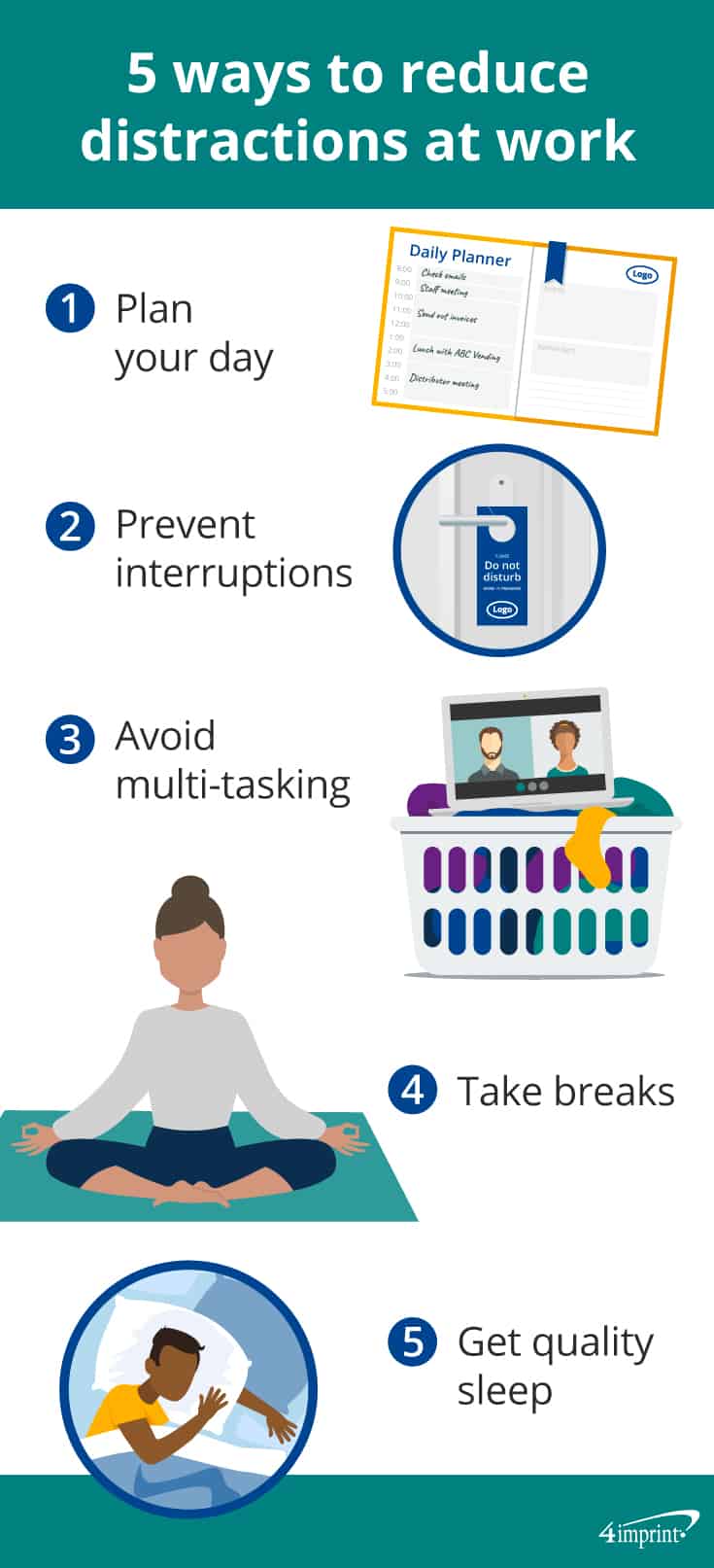An email notification. A phone call. A question from a teammate. Chatter among co-workers. Distractions at work are everywhere. Those working from home have their own distractions—family members, pets and unexpected visitors. And the cost is significant.
It takes an estimated 23 minutes and 15 seconds to refocus when a distraction at work occurs.

Lost productivity isn’t the only cost. Distractions can increase stress and diminish moods, too.
How to reduce distractions at work
Whether your employees are working from home, at the office or a combination of the two, there are many ways to reduce workplace distractions. We offer five tips plus promotional items for employees that may help.

1. Plan the day
Planning the day is one of the best ways for employees to maintain focus. Encourage employees to block time on their calendars for every task they expect to complete each day. This can be done on a daily or weekly basis. Include time for breaks, lunch and unplanned work for a more realistic snapshot of the workday. By having a thoughtful plan, your team can be more intentional about how they spend their time.
A planner and to-do notes are helpful planning tools. Give to new employees during onboarding, pass out at your next staff meeting or mail them to at-home workers.
2. Reduce interruptions
The urge to constantly check email, social media and instant messages wreaks havoc on productivity and focus.
One survey of 50,000 workers found the average respondent checked communication tools like email and messaging apps every six minutes.
Stop the influx of rings and dings by encouraging employees to turn off notifications on their computers and phones. Make checking messages an intentional choice made at planned times. This rule applies to other interruptions, too. Those who are working on a project can block off time on their calendars with “do not disturb”. If their workspace offers the privacy of a door, urge them to close it and hang a do not disturb sign.
3. Avoid multi-tasking
When faced with a barrage of workplace distractions, it’s only natural to start multi-tasking. Remind employees that multiple studies show multi-tasking simply doesn’t work. Those who attempt it make more mistakes, miss important information and retain less, causing decreased productivity and sometimes costly rework.
Employees can resist the urge to multi-task by clearing their desks and screens of everything unrelated to the task at hand. Have them put away unneeded files and documents and log out of personal email and instant messaging. In other words, non-work tasks like eating lunch, checking social media or shopping online should be done away from the workspace. This helps condition the brain to focus solely on work when at the workspace. Send employees a message board with “work zone only” written on it as a fun reminder.
4. Take breaks
The brain requires regular breaks in order to maintain focus. A recent Psychology Today® article recommends building breaks into the workday. Schedule meetings in 25-minute increments (versus the standard 30-minutes). For example, if a meeting runs from 10:00 to 10:50, have employees take a break until 11. Hand out ear buds so they can relax to music. If their schedule is just too jammed for scheduled breaks, encourage walking meetings as an alternative. A fanny pack is sure to be appreciated.
5. Get quality sleep
One in three people gets less than the recommended amount of sleep each night.
. A lack of sleep depletes energy and can lead to poor concentration. Hold an employee wellness challenge that encourages healthy sleep habits, such as:
- Get eight hours of sleep each night
- Go to bed and wake at the same time each day
- Turn off screens two hours before bed
- Avoid caffeine late in the day
- Avoid alcohol
Award points for each sleep-promoting behavior and give prizes, like a sleep mask or cozy blanket, to top earners.
Say goodbye to distractions at work
Staying focused is hard work. Share these tips and promotional items for employees to help your team say goodbye to distractions and hello to focus and productivity.
Key takeaways:
- Plan the day to keep employees focused on work
- Turn off notifications to reduce interruptions
- Stop multi-tasking
- Take regular brain breaks
- Get the proper amount of sleep nightly
PSYCHOLOGY TODAY is a registered trademark of Sussex Publishers LLC LIMITED LIABILITY COMPANY DELAWARE 115 East 23rd Street, Floor 9 New York NEW YORK 10010
